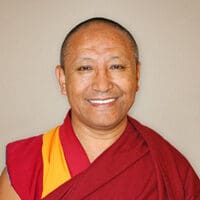Overview
As Buddhist ideas and contemplative practices are increasingly applied and integrated into contemporary Western societies, the views and methods of Western science are likewise beginning to enter the Buddhist world. As part of his active collaboration between modern scientists and Buddhist contemplatives, His Holiness the Dalai Lama has initiated a process for the integration of modern science education into the Tibetan monastic curriculum. With the support of the Library of Tibetan Works and Archives (LTWA), this process began in the late 1990s via science workshops sponsored by Science for Monks and basic courses offered by Science Meets Dharma. In 2006, His Holiness invited Emory University to collaborate with the LTWA to develop and implement a sustainable science curriculum for monastics, which is now being implemented at nine major Tibetan monasteries. In 2013, the Geluk leadership adopted a historic resolution to include science education as part of the core Gelukpa monastic curriculum, the first major change to this system in 600 years. In this session, we will hear perspectives from both sides of this cultural exchange. Geshe Lhakdor, Geshe Lobsang, and Geshe Dadul will discuss efforts to incorporate science into the monastic education system in a sustainable way, sharing successes, challenges, and future plans. Their presentations will be followed by Yangsi Rinpoche, who will offer reflections on sharing Buddhist ideas in Western culture. Drawing from his experience as the president of Maitripa Buddhist College in Portland, Oregon, his presentation will focus on the challenges and opportunities of teaching Buddhist theory and practices (mindfulness and compassion) in a Western academic setting.
- Dialogue 3019 sessions
- December 17, 2015Sera Monastery, Bylakuppe, India


